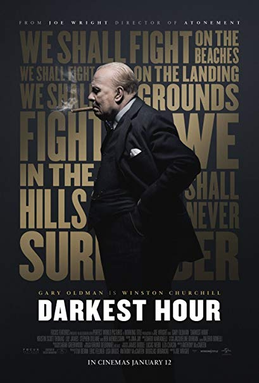
Given that the first live TV broadcast of the FA Cup Final happened in 1938, it is appropriate that I mention that Mrs B and I went to watch the "Darkest Hour" in Sheffield this afternoon. Yes, in retirement one can watch movies in the afternoon, before tea time, Pointless, The Archers and bed.
The audience was mainly older that me, there was quite a lot of shouting going on as one of a pair watching this World War Two movie, explained to the other what was going on it the film. Actually I should have shouted at the elderly lady sitting behind who spent a lot of the film rustling through a bag of sweets and munching noisily. Hey ho!
The 1938/9 Cup Final on 29th April was won by Portsmouth (17th in Div 1) who beat Wolves 4-1 (2nd in League) at Wembley (99,370 watched this).
Grimsby (10th) lost to Pompey in the semis when Huddersfield Town (19th) lost to Wolves.
Everton were League Champions. The FL ceased at the end of this season.
By 1939/40 the FA Cup started with an Extra Preliminary Round with clubs such as Chopwell Colliery, Norwich Electricity Works and Leyland Motors (Kingston) taking part. The cup was "abandoned" after this.
International football continued through the 1940s boosting morale. In April 1940, when war was on, England played Wales at Wembley losing 0-1 and later, on May 11th, met Scotland at Hampden, with a draw 1-1. This match was played and watched by 75,000 despite the threat of bombing by the Luftwaffe.
In February 1941, when England played a return match against Scotland at St James' Park, Newcastle, Wilf Mannion, a soldier who had been rescued from Dunkirk a year earlier made his debut for England.
In 1942, on a snowy day in January, Clementine Churchill met the teams at Wembley and all proceeds went to the "Aid to Russia" fund.
At this time international players had to make their own arrangements including travel. In April 1942, the return fixture saw Tommy Lawton publicly complain that "we only got 30 bob for a match (91,000 watched it at Hampden)" and "it was a case of third class travel and our own sandwiches". Lawton scored a hat trick and England lost 4-5 that day!
Matches against Wales and Scotland continued right through the war, to the Victory Internationals in 1945-6. Many players also played for their service teams and maintained fitness and teamwork as a result.
By 1946 Belgium, France (in Paris) and Switzerland joined in the fun playing England to celebrate the end of the conflict, as did Holland. Northern Ireland played England in 1945 at Windsor Park and the Republic played a friendly at Dalymount Park, Dublin.
No comments:
Post a Comment